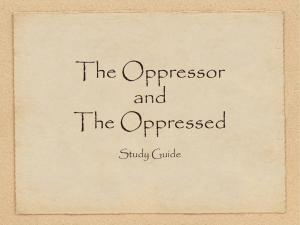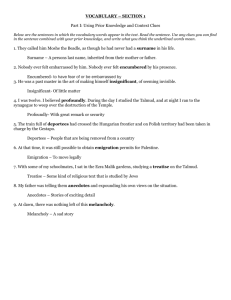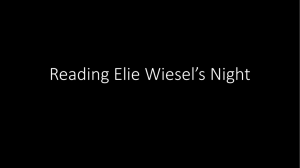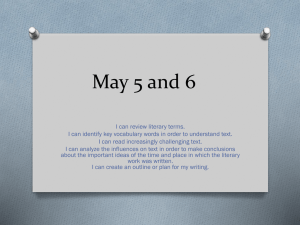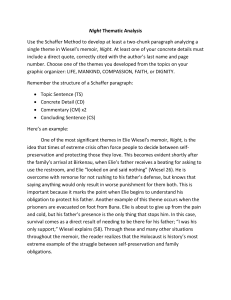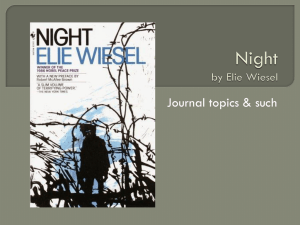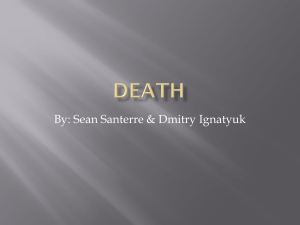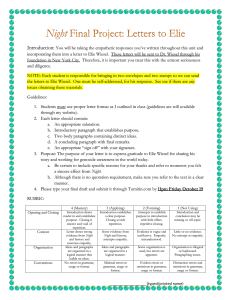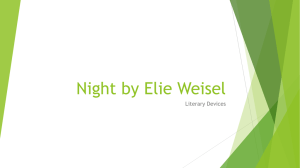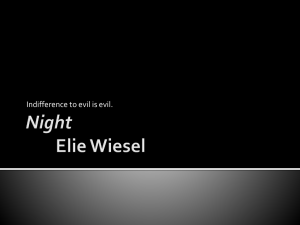Night
advertisement
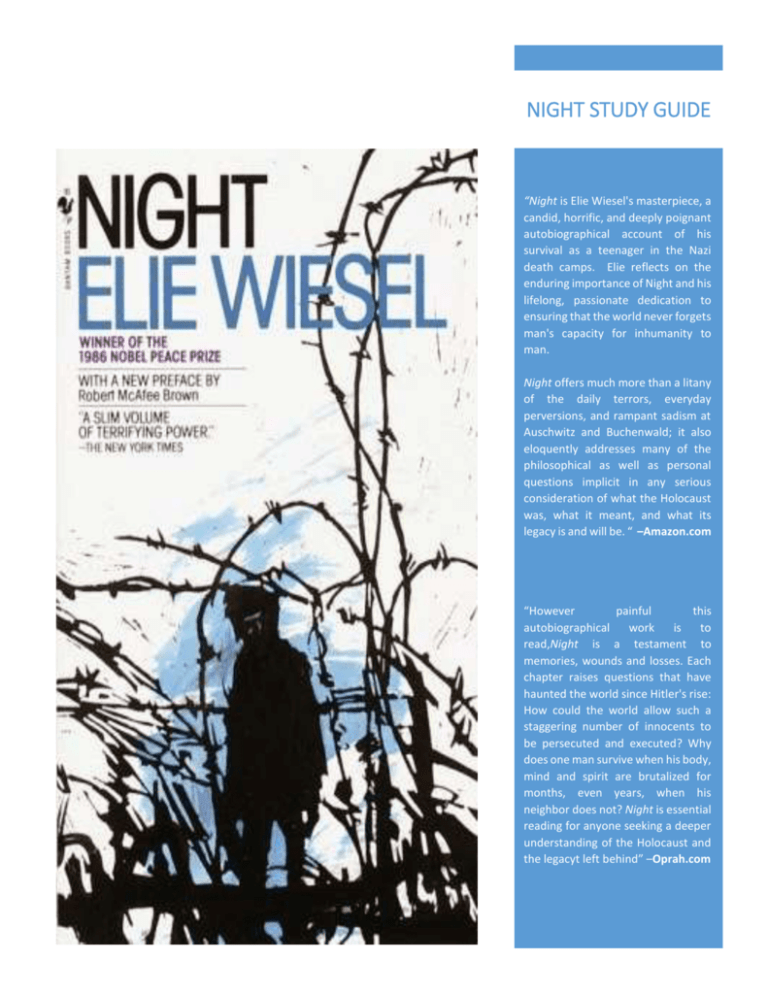
NIGHT STUDY GUIDE “Night is Elie Wiesel's masterpiece, a candid, horrific, and deeply poignant autobiographical account of his survival as a teenager in the Nazi death camps. Elie reflects on the enduring importance of Night and his lifelong, passionate dedication to ensuring that the world never forgets man's capacity for inhumanity to man. Night offers much more than a litany of the daily terrors, everyday perversions, and rampant sadism at Auschwitz and Buchenwald; it also eloquently addresses many of the philosophical as well as personal questions implicit in any serious consideration of what the Holocaust was, what it meant, and what its legacy is and will be. “ –Amazon.com “However painful this autobiographical work is to read,Night is a testament to memories, wounds and losses. Each chapter raises questions that have haunted the world since Hitler's rise: How could the world allow such a staggering number of innocents to be persecuted and executed? Why does one man survive when his body, mind and spirit are brutalized for months, even years, when his neighbor does not? Night is essential reading for anyone seeking a deeper understanding of the Holocaust and the legacyt left behind” –Oprah.com A Few Notes About the Author: Elie Wiesel WIESEL, Eliezer 1928- Elie Wiesel was born on September 20, 1928, in Sighet, Transylvania. His parents owned and operated a store, and his mother was also a teacher. He credits his maternal grandfather with his love of storytelling. As a child and adolescent, Wiesel studied the Talmud, Hasidism, and the Kabala. During the years when he was studying so seriously, he thought it was a waste of time to read novels. Just after Passover in 1944, when Wieisel was 15, the Nazis sent all of the Jews in Singhet to the concentration camp at Auschwitz-Birkenau. He and his father were later transferred to Buchenwald. He was 16 when the war ended and he was released. Wiesel traveled to France and was reunited with his two older sisters. Wiesel studied at the Sorbonne from 1948 until 1951. He learned the French language and took courses in literature, psychology, and philosophy. He tutored other students, directed a church choir, and worked as a translator to support himself. Soon after his release from the concentration camps, Wiesel realized that he had a duty as a survivor to let others know what had happened. He was encouraged in this endeavor by Francios Muriac, a Catholic writer whom Wiesel met in Israel. Wiesel's first book, And the World Has Remained Silent, was published in Yiddish in 1956. The abridged, autobiographical version, Night, was published in Paris in 1958. Since then it has been translated into eighteen languages and is his best-known work. Wiesel traveled to the United States in 1956 to write about the United Nations. He was hit by a taxi cab in Times Square. Since he was unable to return to France to renew his residency papers, he instead applied for United States citizenship. He married another Holocaust survivor, Marion Erster Rose, in New York in 1969. In 1976 Wiesel became the Andrew W. Mellen Professor in Humanities at Boston University. President Carter named him the chairman of the President's Commission on the Holocaust and the chairman of the U.S. Holocaust Memorial Council. Wiesel has received numerous awards and honors. In 1986 alone he was awarded the Nobel Peace Prize, the Freedom Cup Award from the Women's League for Israel, the Jacob Javits Humanitarian Award of the UJA Young Leadership, and the Medal of Liberty. He holds membership in many societies including the Authors League, a lifetime membership in the Foreign Press Association, American Gathering of Jewish Holocaust Survivors, and the Writers and Artists for Peace in the Middle East. He continues to write and speak for peace and the humanitarian treatment of all peoples. NIGHT: STUDY GUIDE 2 Night: Background Activity #1: Scapegoats and Stereotypes Sources: http://www.historylearningsite.co.uk/adolf-hitler.htm http://library.thinkquest.org/17120/data/bios/hitler/background/backg1.html http://www.newgenevacenter.org/biography/hitler2.htm#life Critical Thinking Questions: 1. What stereotypes did Hitler believe before he came into power in the Germany government? 2. What personal failures did Hitler encounter in his childhood and early adult years? What possible scapegoats did Hitler use to explain these failures? 3. What cultural stereotypes did Hitler take advantage of when he was in power? How did this advance his goals? NIGHT: STUDY GUIDE 3 Stereotypes and Scapegoats Definitions: 1. Scapegoat (noun): The word scapegoat actually originates from a custom in Jerusalem on the Day of Atonement or Yom Kippur. People gathered in the village to project their sins onto a goat. The goat was then taken out into the wilderness to be abandoned. Symbolically, the goat embodied the sins and the village was temporarily purged. "Surely he hath borne our Griefs and carried our Sorrows; Yet we did esteem him stricken, smitten of God and afflicted." (Isaiah 53:4) and "And the Goat shall bear upon him all their iniquities unto a Land not inhabited." (Leviticus 16:22) Scapegoats are also the people we falsely blame or project our own shortcomings or weaknesses on to as a way of distracting them from the real causes. We do this individually. There are also socially accepted scapegoats that the entire society perpetuates. “Scapegoating is a hostile social - psychological discrediting routine by which people move blame and responsibility away from themselves and towards a target person or group. It is also a practice by which angry feelings and feelings of hostility may be projected, via inappropriate accusation, towards others. The target feels wrongly persecuted and receives misplaced vilification, blame and criticism; he is likely to suffer rejection from those who the perpetrator seeks to influence. Scapegoating has a wide range of focus: from "approved" enemies of very large groups of people down to the scapegoating of individuals by other individuals. Distortion is always a feature.” --The Scapegoat Society <http://www.scapegoat.demon.co.uk/> 2. Stereotype (noun): The word stereotype was invented by French printer Firmin Didot in the world of printing; it was originally a duplicate impression of an original typographical element, used for printing instead of the original. American journalist Walter Lippmann coined the metaphor, calling a stereotype a "picture in our heads" saying "Whether right or wrong, imagination is shaped by the pictures seen... Consequently, they lead to stereotypes that are hard to shake." NIGHT: STUDY GUIDE 4 Night: Background Activity #2: Research and Share Objectives: 1. To develop research skills 2. To write to inform by developing and organizing facts to convey information in a Power Point format Activity: Pick one of the topics and develop a 10-15 slide presentation that will help your peers understand the important information necessary to set the context for our study of the novel, Night. You may work with a partner. Reasoning: You are reading about the events that took place in the life of one teen-aged boy, Elie Wiesel . The setting for the autobiographical sketch is Europe in the years between 1941 and 1945. I order to better understand the terrible things that happened to him and millions of other people, you must first understand what the world was like at that time. Topics: 1. Make a time line of the major events of World War II. 2. Research the country of Transylvania. Include its location on a map of prewar Europe. 3. Name the Allies and Axis countries and their leaders. Summarize the political policies and philosophies of each. 4. Identify Adolph Hitler and his role in the Third Reich. 5. Trace the persecution of the Jewish people in Europe. 6. Research the Jewish faith. Include major beliefs and holy days. 7. Explain the beliefs and practices of the Hasidic Jews. Compare these to the beliefs and practices of the Reform Jews. 8. Trace the origin and development of the Jewish nation, Israel. 9. Briefly explain the teachings of the Talmud, the Zohar and the Cabbala. 11. Describe any one of the concentration camps. Include a map with its location. 12. Describe the Occupation. Include the events that led up to it. 13. Describe the countries that made up pre-war Europe. Include the racial make-up of each. Draw a map to show the location of each country. 14. Discuss the involvement of the United States in World War II. 15. Summarize the events of World War I and explain how they led to World War II. 16. Explain the roles of the SS and the Gestapo. 17. Explain the significance of the Nobel Peace Prize. 18. Read and report on Elie Wiesel's continuing work for peace and human rights. 19. Explain how and where the surviving Jewish people resettled after the war. NIGHT: STUDY GUIDE 5 PowerPoint Basics 1) Match Design to Purpose Decide if your presentation is meant to entertain, inform, persuade, or sell. Is a light-hearted or a more formal approach most appropriate to the subject and your audience? Keep colors, clip art, and templates consistent with your main objective. 2) Keep It Simple As with any design, cut the clutter. Two font families is a good rule of thumb. No more than one graphic image or chart per slide is another good rule (excluding any corporate logo or other recurring element in the design). If you have a quote or a long statement that cannot be chopped up into bullet points, put it up either on the screen and allow people to read it The 666 rule (no more than 6 words per bullet, 6 bullets per page, and 6 word slides in a row) 3)Maintain Effective use of Slide Transitions, Animations and Sound Effects While the thought process behind these special effects is, "This highlights my point and emphasizes the importance," the outcome is often the opposite. People tend to get distracted by the effects. Want to emphasize a main point? Put it on the screen by itself and let people read it. 4) Follow the Basic Rules of Design The use of White Space and Eye-lines is crucial to effectiveness. 5) Overuse of Templates If the template works for your presentation, then use it. Do not make the mistake of trying to fit your info into the template (the template should work for you, not against). NIGHT: STUDY GUIDE 6 Night Background Presentation Rubric Checklist: Necessary Component Does the presentation contain adequate visuals? How this is demonstrated in my presentation: Is your slideshow/powerpoint/Prezi professional and informative? Are we prepared, and have all our materials? Criteria Level 1 Level 2 Level 3 Level 4 Clear expression of ideas/ presentation of a point of view (C) - communicates information as isolated pieces in a random fashion - communicates important information but not a clear theme or overall structure - clearly communicates main idea or theme and provides suitable support and detail - clearly and effectively communicates main idea, theme, or viewpoints Presentation of a point of view (T) - point of view unclear - point of view apparent but unclear at times - clear point of view - provides support of viewpoint with rich or persuasive detail Provision of supporting evidence (K/U) - information provided not clear as evidence: limited accuracy or relevance - evidence clear and supports point of view, though not consistently; few inaccuracies - evidence clear and consistently supports point of view - evidence is thorough and detailed suggesting a degree of mastery Communication appropriate to medium (oral)/ final product format (A and C) - limited demonstration of effort for presentation; limited attention paid to language and style - some attention to language and style, but pacing requires more attention - suitable effort and presentation shown - presentation appears well rehearsed -any result below Level 1 is a failure to meet the basic minimum requirements for that skill Comments/Next Steps: NIGHT: STUDY GUIDE 7 Night: Background Activity #3: KWL Directions: Before reading, think about what you already know about Night and/or Elie Wiesel. Write the information in the K column. Think about what you would like to find out from reading the book. Write your questions in the W column. After you have read the book, use the L column to write the answers to your questions from the W column, and anything else you remember from the book. K W L What I Know What I Want to Find Out What I Learned NIGHT: STUDY GUIDE 8 Night: Content and Vocabulary Questions Section 1 Part I: Using Prior Knowledge and Context Clues Below are the sentences in which the vocabulary words appear in the text. Read the sentence. Use any clues you can find in the sentence combined with your prior knowledge, and write what you think the underlined words mean on the lines provided. 1. They called him Moshe the Beadle, as though he had never had a surname in his life. __________________________________________________________________________ 2. Nobody ever felt embarrassed by him. Nobody ever felt encumbered by his presence. __________________________________________________________________________ 3. He was a past master in the art of making himself insignificant, of seeming invisible. __________________________________________________________________________ 4. I was twelve. I believed profoundly. During the day I studied the Talmud, and at night I ran to the synagogue to weep over the destruction of the Temple. __________________________________________________________________________ 5. The train full of deportees had crossed the Hungarian frontier and on Polish territory had been taken in charge by the Gestapo. __________________________________________________________________________ 6. At that time, it was still possible to obtain emigration permits for Palestine. __________________________________________________________________________ 7. With some of my schoolmates, I sat in the Ezra Malik gardens, studying a treatise on the Talmud. __________________________________________________________________________ 8. My father was telling them anecdotes and expounding his own views on the situation. __________________________________________________________________________ 9. At dawn, there was nothing left of this melancholy. __________________________________________________________________________ Part II: Content Questions 1. 2. 3. 4. 5. 6. 7. 8. 9. Describe Moshe the Beadle Describe Elie Wiesel's father. What was his occupation? Why was Moshe the Beadle important to Elie Wiesel? Summarize the story Moshe the Beadle told on his return from being deported. Why did he say he had returned to Sighet? What was the public reaction to Moshe's story? What was the setting and the year for the first section of the book? What was the world condition at the time? Describe, in order, the events that happened from the last day of Passover until Pentecost. How did Wiesel say he felt about the Hungarian police? Who was Martha? What happened when she visited the Wiesel family in the ghetto? NIGHT: STUDY GUIDE 9 Sections 2 and 3 Part I: Using Prior Knowledge and Context Clues Below are the sentences in which the vocabulary words appear in the text. Read the sentence. Use any clues you can find in the sentence combined with your prior knowledge, and write what you think the underlined words mean on the lines provided. 1. Free from all social constraint, young people gave way openly to instinct, taking advantage of the darkness to flirt in our midst. . . __________________________________________________________________________ 2. We still had a few provisions left. But we never ate enough to satisfy our hunger. __________________________________________________________________________ 3. The world was a cattle wagon hermetically sealed. __________________________________________________________________________ 4. The heat, the thirst, the pestilential stench, the suffocating lack of air-- these were nothing as compared with these screams which tore us to shreds. __________________________________________________________________________ 5. In the middle stood the notorious Dr. Mengele. . . __________________________________________________________________________ 6. . . . a typical SS officer: a cruel face, but not devoid of intelligence, and wearing a monocle. __________________________________________________________________________ 7. . . . a typical SS officer: a cruel face, but not devoid of intelligence, and wearing a monocle. __________________________________________________________________________ 8. In one ultimate moment of lucidity it seemed to me that we were damned souls . . . __________________________________________________________________________ 9. "You are at Auschwitz. And Auschwitz is not a convalescent home." __________________________________________________________________________ 10. They were all laughing and joking and shouting blandishments at one another for a good part of the way. __________________________________________________________________________ Part II: Content Questions 1. 2. 3. 4. 5. 6. 7. 8. 9. 10. 11. To what did Wiesel compare the world? What did Madame Schächter see in her vision? How did the other people in the car react to Madame Schächter? Where did the train stop? What did the Jews in the train car discover when they looked out the window? When did Wiesel say the travelers left their illusions behind? Which notorious SS officer did they meet at Auschwitz? What was Elie's main thought as the men and women were being herded from the train? What prayer were the people saying? Why was it unusual? What did Elie do when the gypsy struck his father? Why? What was his father's response? How long were Elie and his father at Auschwitz? Where did they go after that? NIGHT: STUDY GUIDE 10 Section 4 Part I: Using Prior Knowledge and Context Clues Below are the sentences in which the vocabulary words appear in the text. Read the sentence. Use any clues you can find in the sentence combined with your prior knowledge, and write what you think the underlined words mean on the lines provided. 1. Our convoy included a few children ten and twelve years old. __________________________________________________________________________ 2. One day when Idek was seized with one of his fits of frenzy, I got in his way. __________________________________________________________________________ 3. This was Franek's chance to torment my father and to thrash him savagely every day. __________________________________________________________________________ 4. This was Franek's chance to torment my father and to thrash him savagely every day. __________________________________________________________________________ 5. I once saw one of thirteen beating his father because the latter had not made his bed properly. __________________________________________________________________________ 6. "Bare your heads!" yelled the head of the camp. His voice was raucous. __________________________________________________________________________ 7. The Gestapo, summoned to the spot, suspected sabotage. They found a trail. __________________________________________________________________________ Part II: Content Questions 1. 2. 3. 4. 5. 6. 7. Describe Elie's encounter with the dentist. What did Elie Wiesel do when Idek hit his father? What was he thinking? Who took Elie's gold tooth? Why did Elie give it up? What were the only things in which Elie took an interest? How did Elie describe the men after the air raid? What happened to the young man from Warsaw? Why? How did Elie say the soup tasted the night the pipel (young servant boy) was hanged? Section 5 Part I: Using Prior Knowledge and Context Clues Below are the sentences in which the vocabulary words appear in the text. Read the sentence. Use any clues you can find in the sentence combined with your prior knowledge, and write what you think the underlined words mean on the lines provided. 1. This day I had ceased to plead. I was no longer capable of lamentation. __________________________________________________________________________ 2. In the depths of my heart, I felt a great void. __________________________________________________________________________ 3. A poor, emaciated, dried-up Jew questioned him avidly in a trembling voice. . . __________________________________________________________________________ NIGHT: STUDY GUIDE 11 4. Several days had elapsed. __________________________________________________________________________ 5. It was a somewhat feeble argument. __________________________________________________________________________ 6. They were quite simply liberated by the Russians two days after the evacuation. __________________________________________________________________________ 7. It snowed relentlessly. __________________________________________________________________________ Part II: Content Questions 1. 2. 3. 4. 5. 6. 7. 8. 9. What did the men do on the eve of Rosh Hashana? How did Elie feel while the others were praying? What was Elie's decision about fasting on Yom Kippur? Why did he make that decision? What was Elie's "inheritance" from his father? Why was his father giving it to him? Did the men remember to say the Kaddish for Akiba Drumer? What did Elie dream of when he dreamed of a better world? What happened to the patients who stayed in the hospital instead of being evacuated? What was the last thing the head of the block ordered the men to do before they evacuated? Why? What was the weather like during the evacuation? Sections 6, 7, 8, and 9 Part I: Using Prior Knowledge and Context Clues Below are the sentences in which the vocabulary words appear in the text. Read the sentence. Use any clues you can find in the sentence combined with your prior knowledge, and write what you think the underlined words mean on the lines provided. 1. Their fingers on the triggers, they did not deprive themselves of this pleasure. __________________________________________________________________________ 2. He sat up and looked round him, bewildered, stupefied--a bereaved stare. __________________________________________________________________________ 3. From time to time, the SS officers on motorcycles would go down the length of the column to try and shake us out of our growing apathy. __________________________________________________________________________ 4. His livid face was covered with a layer of frost. __________________________________________________________________________ 5. The days were like nights, and the nights left the dregs of their darkness in our souls. __________________________________________________________________________ 6. Wild beasts of prey, with animal hatred in their eyes; an extraordinary vitality had seized them, sharpening their teeth and nails. __________________________________________________________________________ 7. He was finished, at the end of his tether. __________________________________________________________________________ 8. The contagion spread to the other carriages. __________________________________________________________________________ NIGHT: STUDY GUIDE 12 9. A plaintive, beseeching voice caught me in the spine. __________________________________________________________________________ 10. And, in the depths of my being, in the recesses of my weakened conscience, could I have searched it, I might perhaps have found something like--free at last! __________________________________________________________________________ Part II: Content Questions 1. 2. 3. 4. 5. 6. 7. 8. 9. 10. While running, an idea began to fascinate Elie. What was the idea? What kept him from carrying out his idea? What did Elie realize about Rabbi Eliahou and his son? What was the name of the camp to which the men walked? Describe Elie's meeting with Juliek. How long were they at Gleiwitz? Where did they go next? Who was Meir Katz? What happened to him? How many men started out in the train? How many were left when they arrived at Buchenwald? What happened to Mr. Wiesel, Elie's father? What was Elie's only desire? What happened on April 10, 1945? Night: Cloze Passage Directions: Use the words from the box to complete the sentences. There will be words left over. American Fascists Passover Auschwitz ghettos Pentecost Moshe the Beadle Sighet Buna Palestine Transylvania Birkenau Gleiwitz resistance Buchenwald Night is the autobiographical account of Elie Wiesel's time in the concentration camps in Europe during World War II. He grew up in the town of (1)______________, in the country of (2) _________________. The people knew there was a war going on, but were not paying much attention. Even when (3) _______________ returned to the town to tell his terrible tales of mass murders of Jews, the people would not believe it.. Elie tried to persuade his father to move to (4) ____________ but his father would not do it. Even the news that the (5) _________________ in Budapest were destroying Jewish shops and synagogues did not convince the people that danger was coming. During the Spring of 1944 the German army moved into the town. On the seventh day of (6) ______________ the Germans arrested the leaders of the Jewish community. Soon after, two (7) ________________ were set up and all of the Jewish people were made to move there. On the Saturday before (8) __________________, Stern told the others they were to be deported. The train carrying the Wiesel family and their neighbors stopped first at (9) _________________, which was the reception center for (10) _________________. Elie was separated from his mother and sisters here, although he was able to stay with his father. They stayed in this camp for three weeks. Then they were forced to walk for four hours to another camp at (11) _______________. Sometime around the end of January, 1945, the front drew near the camp. The prisoners were evacuated to (12) ________________. They stayed at this camp for three days without food or water. Then they were taken by train to (13) _________________. Chlomo Wiesel died here during the night of January 28, 1945. Elie stayed there in the children's block until the (14) _________________ movement liberated the camp and the (15) __________________ tanks arrived. NIGHT: STUDY GUIDE 13 Night: Figures of Speech Figures of speech are literary devices that give the writer a non-literal way to describe images and events. They are comparisons that help the reader create a mental image of a character or a situation. HYPERBOLE: Extreme exaggeration used to describe a person or thing. For example: She has as many pairs of earrings as there are stars in the sky. IRONY: The use of words to express something different from and often opposite to their literal meaning. For example: Yeah, being a kid is one laugh after another. METAPHOR: A comparison without the words like or as. For example: The cat is a bag of bones. METONYMY: A figure of speech in which one word or phrase is substituted for another with which it is closely associated, as in the use of Washington for the United States government or of the sword for military power. ONOMATOPOEIA: The use of words such as buzz or splash that imitate the sounds associated with the objects or actions they refer to. PARADOX: A seemingly self-contradictory statement that has some truth to it. For example: sitting may be more exhausting than standing PERSONIFICATION: Attributing human characteristics to inanimate objects, animals, or ideas, as in the wind howled. SIMILE: A comparison using the words like or as. For example: I felt as light as a feather. NIGHT: STUDY GUIDE 14 Night: Figures of Speech Chart Figures of speech are literary devices that give the writer a non-literal way to describe images and events. The main types of figures of speech are hyperbole, irony, metaphor, metonymy, onomatopoeia, paradox, personification, and simile. Use the following chart to record examples of figures of speech used in Night. A sample has been done for you. Note: You may not find an example of each figure of speech in the novel. Figure of Speech NIGHT: STUDY GUIDE Example from the Novel (incl. pg #) Literal Meaning 15 Night: Writing Assignment #1: Blog OBQs Using the OBQ format that we have discussed in class, create 3 blog entries (of at least 200 words each). You are to pick one question from each of the sections (Interpretation, Critical, and Personal Response). Interpretation 1. From what point of view is the story written? How does this affect our understanding of the story? 2. Why didn't the townspeople listen to Moshe the Beadle? 3. Describe Elie's relationship with Moshe the Beadle. 4. Why did the young girl at Buna risk her safety to speak to Elie in German? 5. In Section 4, Wiesel described the hanging of one young man. Then he said his soup was excellent that evening. What did he mean? 6. In Section 4, Wiesel described the hanging of the pipel, the young servant boy. He said the soup tasted of corpses that night. What did he mean? 7. Describe and analyze Elie Wiesel's changing view of God throughout the book. 8. In Section 6, why did Mr. Wiesel smile? 9. Describe the relationship between Elie and his father while they were in the concentration camps. Compare and contrast this with their relationship before their imprisonment. 10. Why do you think Moshe the Beadle stayed in Singhet when the people would not listen to him? What does this say about his character? 11. Why do you think Mr. Wiesel refused to go with Martha when she offered a safe refuge? 12. Was Madame Schächter crazy, or was she able to predict what was going to happen to the Jews? 13. Why did the Jews hold onto their illusions for so long? 14. In Section 5, why did Elie and his father choose to be evacuated instead of staying in the hospital? Critical 15. How did Elie Wiesel change over the course of the book? Were these changes for the better? 16. The author often used vivid language to describe a scene or event. Give an example of his use of vivid language that you found most effective. Tell why it was effective. 17. What was the overall mood of the story? Give examples to support your answer. 18. How would the story change if there were a different narrator? 19. Which character do you know the most about? Which character do you know the least about? 20. Were you able to predict the ending? What clues did the author give? 21. Discuss the author's use of language. Is it natural? Do people you know talk the way the characters did? NIGHT: STUDY GUIDE 16 22. Does the mood of the story change? How does the author show this? 23. What words does the author use to create the atmosphere of the book? 24. Were the descriptions in the book effective? Give some examples. 25. Which senses did the descriptions cause you to use? Give examples of the descriptions using hearing, seeing, touching, smelling, taste. Personal Response 26. Did you enjoy reading Night? Why or why not? 27. Is Night a good title for the book? Why or why not? If not, what title would you suggest? 28. Did you have strong feelings while reading this book? If so, what did the author do to cause those feelings? If not, why not? 29. Will you read more of Elie Wiesel's books? Why or why not? 30. Did Elie Wiesel's experiences change the way you look at yourself? How? 31. Have you read any other stories similar to Night? If so, tell about them. 32. Would you recommend this book to another student? Why or why not? 33. What makes Elie Wiesel a unique and different author? 34. What questions would you like to ask Elie Wiesel? 35. What was the saddest part of the story? 36. What do you remember most about the story? 37. What picture did the author leave in your mind? 38. What did the book make you think about? NIGHT: STUDY GUIDE 17 Night: Writing Assignment #2: Persuasive Essay SETUP: Four times in the novel, Elie Wiesel describes times he and his family might have been saved, had they made a different decision. First, Moshe the Beadle tried to convince the Jews of Singhet to flee from the coming persecution, but no one listened to him. Then, Elie tried to convince his father to sell the business and emigrate to Palestine. Later, the Wiesel family refused the safe refuge offered by their former servant, Martha. When Elie and his father were given the choice to stay at the camp hospital or be evacuated with the other prisoners, they chose to stay with the others. Your assignment is to choose one of these opportunities and convince the Wiesel family to make the opposite decision of the one they made. PREWRITING: Make a list of the reasons you want the family to leave Singhet, go with Martha, or stay at the hospital. Think of statements to support each of your reasons, and list them under each reason. You can also include reasons you disagree with them. Then number the reasons in order from most to least important. DRAFT: Make an introductory statement in which you state the problem (the Wiesel family and the other Jewish residents/prisoners are in grave danger.) Then offer your solution. Use one paragraph for each of your reasons. Use supporting statements for each reason. Include examples, facts, and feelings that support your position. Write a closing paragraph that restates your request and summarizes your arguments. PEER CONFERENCING/REVISING: When you finish the rough draft, ask another student to look at it. You may want to give the student your notes so he/she can double check for you and see that you have included all of the information. After reading, he or she should tell you what he/she liked best about your persuasive essay, which parts were difficult to understand or needed more information, and ways in which your work could be improved. Reread your persuasive essay considering your critic's comments and make the corrections you think are necessary. PROOFREADING/EDITING: Do a final proofreading of your persuasive essay, double-checking your grammar, spelling, organization, and the clarity of your ideas. FINAL DRAFT/PUBLISHING: Complete the final draft and check it against the rubric before you hand it in. NIGHT: STUDY GUIDE 18 Night: Persuasive Essay Rubric -any result below Level 1 is a failure to meet the basic minimum requirements for that skill Criteria Clear expression of ideas/ presentation of a point of view (C) Level 1 - communicates information as isolated pieces in a random fashion Presentation of a point of view (T) - point of view unclear Provision of supporting evidence (T and K/U) - information provided not clear as evidence; limited accuracy or relevance - presents information in a style and tone which matches audience's interest and level of knowledge in a limited way - limited demonstration of effort for presentation; limited attention paid to language and style Effective communication with diverse audiences (C and A) Communication appropriate to medium (written) / final product format (A and C) Level 2 - communicates important information but not a clear theme or overall structure - point of view apparent but unclear at times Level 3 - clearly communicates main ideas or themes - evidence clear and supports point of view, though not consistently; few inaccuracies - presents information in a style and tone which moderately match audience's interest or level of knowledge - evidence clear and consistently supports point of view some attention to language and style - suitable effort and thoughtful preparation clearly shown - clear point of view - presents information in a style and tone consistent with audience's interest and level of knowledge Level 4 - clearly and effectively communicates main ideas, themes or viewpoints - provides support of point of view using rich and persuasive detail - evidence is thorough and detailed suggesting a degree of mastery - presents information in a style that effectively capitalizes on the audience's interest and level of knowledge - evidence that text format matches conventions of quality design Comments: Next Steps: NIGHT: STUDY GUIDE 19 Night: Personal Reflection In reflecting on Night, list three specific things that you have learned regarding what kind of person you want to be. 1. ______________________________________________________________________ 2. ______________________________________________________________________ 3. ______________________________________________________________________ In reflecting on Night, list three specific things that you have learned regarding what kind of world you would like to inhabit. 1. ______________________________________________________________________ 2. ______________________________________________________________________ 3. ______________________________________________________________________ In reflecting on Night, list three current world events/news stories that you think have some specific connection to the events that Wiesel describes. 1. ______________________________________________________________________ 2. ______________________________________________________________________ 3. ______________________________________________________________________ NIGHT: STUDY GUIDE 20
